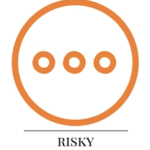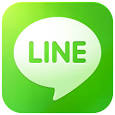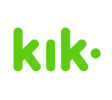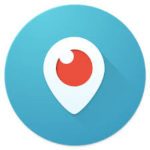
With new apps and social networks popping up weekly, it can be difficult to stay on top of them all. That’s why we are here to help. Browse our comprehensive list below to get an idea of what the network is, the appeal to users, the risks, and additional resources to help you out. Each site is rated on how it affects your digital identity and safety.
 Positive networks and apps, when used properly, are great ways to share with friends and develop an online identity that reflects who you are.
Positive networks and apps, when used properly, are great ways to share with friends and develop an online identity that reflects who you are.
 Risky networks and apps have elements that allow other people to access your data or to reach a user in an unsafe way. You need to be extra careful using these.
Risky networks and apps have elements that allow other people to access your data or to reach a user in an unsafe way. You need to be extra careful using these.
 Negative networks and apps do not add to your digital identity in a good way and are likely to put you or your data at risk.
Negative networks and apps do not add to your digital identity in a good way and are likely to put you or your data at risk.
The List
Looking for a network that we are missing? Let us know and we’ll add it in.
After School
… is like writing on a bathroom wall.
Using GPS and centred around school campuses, people create anonymous messages, confessionals or campus gossip backed by stock-image like pictures. The content here tends to be on the taboo or nasty side.

Appeal:
- Hidden behind an anonymous username, people feel free to post anything
- Gossip site specific to a school
- Confessionals allow people to get secrets off their chest
Risk:
- Anonymity breeds bullying
- False sense of security for users that they cannot be found out… but they can by legal agencies
Other Resources:
Ask.fm
… is like being in a dark interrogation room.
You put yourself out there and then anonymous and random people fire questions at you. Often the questions are very personal or inappropriate. This site has the highest known incidence of cyber bullying. They should rename it the Spanish Inquisition.

Appeal
- It’s become a game to put yourself out there, especially for kids whose friends are on it
- You get to be the centre of attention
Risk:
- Due to the anonymity, questions tend to be negative and can quickly become inappropriate and overtly sexual
- Users are easily bullied or harassed
- Without privacy settings, users often reveal personal information
Other Resources:
- YMC Blog: The AnAnonymous Apps Your Kids Are Using
- Blog: The Apps Teens Use: How to Start a Dialog
Brighten
… is like a public yearbook where you can write messages to other people.
The app was designed as a forum to compliment people and brighten their day. You need to add ‘friends’ to your circle to comment on them.

Appeal:
- Another place for people to connect and leave comments on each other in closed circles
Risk:
- Despite the fact that users are identified and added to each other’s circles, people, especially kids, are still using this as a forum to bully each other
Other Resources:
Bumble
… is like a female empowered Tinder.
Bumble was created by the original female co-founder of Tinder. She found that women were being harassed on Tinder so Bumble allows only women to contact men. Men have 24 hrs to respond when contacted.
Though started as just a dating app, Bumble now includes profiles for business connections and a ‘BFF’ area to make friends. They all look the same though. What could go wrong?

Appeal:
- Same fun dating app as Tinder but with added safety of women getting to make the first move
- Additionally allows you to meet friends
Risk:
- As a location based app, you are giving away information about where you are
- Information is pulled from Facebook which means Bumble gets lots of extra data
- You could confuse the work area with the dating area
Other Resources:
Chatroulette
… is like a accidentally skyping the wrong person and chatting with them anyway.
Get connected via video chat to strangers where you can engage in 2 second or 2 hour conversations with them.

Appeal:
- People love in engaging in chats with strangers
- You can see the person you are talking to so they cannot fool you in to thinking they are someone of a vastly different age/gender
Risk:
- They have increased moderators due to inappropriate content but it still sneaks through
- It is a popular place for predators looking to connect with vulnerable users
Other Resources:
- YMC Blog: Preventing Kids From Being Lured Over Social Media
- Blog: The Apps Teens Use: How to Start a Dialog
… is like a house party.
You open your house to everyone you are ‘friends’ with. You let them in to view all the pictures that you have on display, rifle through your DVD collection and sift through your library. Randomly, you make announcements that some people listen to and that may prompt discussion amongst your friends.
Occasionally a friend will come to you and ask if you like their shirt. You may say yes, and that is cool. Sometimes that person is carrying a recording device when they ask if you like the shirt [public item]. You say yes and then the company that makes the shirt hears the recording and notes that you are a fan. You can watch for people with recorders but sometimes you don’t notice.
You also need to make sure that no one else knows about your house party so be sure it is closed invitation only for friends.

Appeal:
- Great way to connect with people near and far to share pictures and thoughts
- Has its own news feed tailored to your interests
- Integrated messaging system
Risk:
- Over sharing danger, especially with privacy settings that can be confusing
- Private message system is kept by Facebook
- People, kids especially, are looking for validation through ‘Likes’
Other Resources:
- YMC Blog: Hidden Facebook Settings You Should Know About
- YMC Blog: Preventing Kids From Being Lured Over Social Media
- Blog: Sharenting: 5 Tips to Keep Your Kids Safe
- Blog: Fakebook, Instasham, and Outwitter
- Blog: Who Will Own Your Digital Legacy?
- Blog: Let’s be Friends
- Blog: The Apps Teens Use: How to Start a Dialog
Foursquare
… is like giving everyone you know a receiver for your GPS tracking device.
The site is designed to let your friends know which restaurants and places you frequent, but really it just turns you in to a human beacon so people know where you are at all times.

Appeal:
- Use your friends as guides for places to eat, visit and shop
- Some venues and restaurants will give you coupons or extras for letting people know you ‘checked in’
Risk:
- Over sharing danger, giving away too much information about your schedule and whereabouts
- Places you visit also get access to your information
 Google+
Google+
… is like a house party with party games and your guests sectioned off in rooms.
A lot like the Facebook party only in a Google+ party your friends, family and acquaintances get moved to separate rooms depending on which circle they fall in to. You can also pull out the party game to play with friends at this party. If you want to chat with just a few friends then you can hangout.

Appeal:
- Easily share pictures, articles, videos and statuses with people in your circles
- Google Hangouts are free video conference calls that are easy to use
Risk:
- Over sharing danger, especially with privacy settings that can be confusing
- Combined with Gmail, Google search and YouTube to make a more detailed picture of your digital identity
Other Resources:
 Houseparty
Houseparty
… is like a house party by video, where anyone can invite their friends, even if the host doesn’t know them. So you could end up in a video conference with just about anyone.

Appeal:
- Easily connect for conference video for free
- Add people instantly with a tap
- Fun notifications when people want to add you to a call
Risk:
- Like all live video, you never know what will be shown or said
- Anyone can add a contact so you may be with strangers
- Contacts are publicly searchable by name
Other Resources:
- Video: Parent’s Guide: Group Chat Apps
- Blog: The Apps Teens Use: How to Start a Dialog
- YMC Blog: Preventing Kids From Being Lured Over Social Media
… is like renting out a billboard and posting your photo.
Though your billboard may be in an unpopulated part of town, typically it is available for anyone to see. You can also tell people where your billboard is so you get more people coming to look at it. Your billboards are now owned by Facebook so you can chose to display it at your party.

Appeal:
- A picture is worth a 1000 words
- You can share with a closed group of people or the whole world
- Follow celebrities or people you admire
Risk:
- Often users have people they don’t know in their closed circles, so account may as well be public
- Once the picture is posted it is permanent
- People, kids especially, are looking for validation through ‘Likes’
Other Resources:
- Video: Instagram: A Parent’s Guide
- YMC Blog: Preventing Kids From Being Lured Over Social Media
- Blog: 8 Things You Need to Know About Instagram
- Blog: Fakebook, Instasham and Outwitter
- Blog: The Apps Teens Use: How to Start a Dialog
- Blog: Sharenting: 5 Tips to Keep Your Kids Safe
 Imgur
Imgur
… is like an art gallery where you vote for the images in the front room.
Put up a picture, maybe a short description and leave it up for the world to see. If people like it then it gets moved to the front of the gallery where more people will see it. The more entertaining the better.
Originally designed to support images from Reddit but now acts as a stand alone app. Lots of memes and funny images waiting to go viral.

Appeal:
- Entertaining to browse the images
- Can be used to post an image used on other forums like Reddit
Risk:
- Lots of adult content that may not be appropriate for young audience
- Once an image has gone viral, it cannot be stopped
Other Resources:
Kik
… is like a place where you can talk to anyone if you just shout their name and robots occasionally give you suggestions about suff you like..
You can hang out with one or many friends and share text or media. All you need is someone’s handle (Kik ID) to contact them. Kik is popular because it is an instant messenger that runs on all platforms (Apple, Android, Desktop etc).

Appeal:
- Can access any other users regardless if they are using device or computer
- Groups allow multiple users easily in the same chat
Risk:
- Handles (user IDs) can be publicly accessed thus allowing strangers to contact you
- Lots of ads including new bots that take you to other websites
Other Resources:
- Video: Parent’s Guide: Group Chat Apps
- Blog: The Apps Teens Use: How to Start a Dialog
- YMC Blog: Preventing Kids From Being Lured Over Social Media
 Line
Line
… is like a work video conferencing app for personal use.
Similar to Oovoo, you can connect for free via video, voice, or text. Chat is instant and includes fun stickers. There is also the ability to play games with your network. Fantastic for group work, not so much for the ability to connect with predators.

Appeal:
- Easily connect for conference video or chats for free
- Works on most platforms (desktop and handheld devices)
- Includes a number of games, including some targeted at young kids
Risk:
- Default setting of your ID is public so could be contacted by strangers
- Loads of in-app purchases available for games and stickers
Other Resources:
- Video: Parent’s Guide: Group Chat Apps
- Blog: The Apps Teens Use: How to Start a Dialog
- YMC Blog: Preventing Kids From Being Lured Over Social Media
… is like a business network cocktail party.
Everyone is in suits and a little more formal. Usually people have their resumes taped to their backs. But you can tell who-knows-who and ask them to introduce you. You can even share a business story.

Appeal:
- Professional network to help find and secure jobs or refer others
- A way to connect to colleagues with whom you do not want to share personal information
Risk:
- Very low risk. Privacy settings are tricky but you can chose to hide you profile picture and title
Other Resources:
Live.ly
… is like a having your own live cable access show, from your bedroom, with live audience comments.
Live.ly is a streaming video service by the same people as Music.ly. Unlike Music.ly, in which people record lip synched videos, Live.ly videos are streamed live, as they happen. People can comment on them or ask users to do things in their videos.

Appeal:
- You get to star in your very own video… about you
- Majority of the users are under 25 so it’s still fresh
- You can interact with other users
Risk:
- Kids are filming themselves live and are susceptible to influence by the comments
- Any event could be filmed live – including the inside of a change room or an intimate get-together
- Users are over-exposing their lives and personal information for attention
Other Resources:
- Video: A Parent’s Guide to Periscope and Live Streaming Apps
- Video: Parent’s Guide: Group Chat Apps
- Blog: The Apps Teens Use: How to Start a Dialog
- YMC Blog: Preventing Kids From Being Lured Over Social Media
Meetup
… is like a list of all the extracurricular clubs you may want to join.
Interesting example of using online networks to facilitate offline meetings. You can join a specific group or just browse by taste and you will get a list of all the relevant events that Meetup groups create.

Appeal:
- Easy way to connect to people with similar interests in a given geography
Risk:
- Public forum where information is passed freely on attendees and meet-ups
- Organizers could get unwanted attention
- Users meet-up profile paints a picture of their personal interests
Monkey
… is like a accidentally skyping the wrong person and chatting with them anyway.
Based off of Snapchat, get connected via video chat to strangers where you can engage in a 10 second live conversation. The other user’s age and gender are shared. If you to want to continue the conversation, become connected via Snapchat.

Appeal:
- Targeted at teens, who love meeting strangers
- You can see the person you are talking to so they cannot fool you in to thinking they are someone of a vastly different age/gender
Risk:
- Difficult to moderate so full of nudity, racism, and adult content
- It is a popular place for predators looking to connect with vulnerable users
Other Resources:
- Video: Parent’s Guide: Group Chat Apps
- YMC Blog: Preventing Kids From Being Lured Over Social Media
- Blog: The Apps Teens Use: How to Start a Dialog
MyLoL
.. is like publicly posting yourself on a billboard for dating.
MyLol.com has been around since 2006 but has become popular with teens because of its app. It claims to be a dating app “For Teens” but also has a 17+ rating. Hmmm. Visitors are invited to rank users as “sexy”, “intriguing”, “friendly” or “pretty/handsome”. You can message people you want talk to within the system.

Appeal:
- Fun way to flirt and find singles
- Judge by someone’s face, which you usually do anyway
- Engage with strangers, which kids love to do
Risk:
- Public and open app that displays all of your personal information
- People may not be who they say they are
- Targeted at young kids and rife with bad language and sexual content
Other Resources:
- Blog: The Apps Teens Use: How to Start a Dialog
- YMC Blog: Preventing Kids From Being Lured Over Social Media
Ogle
… is like writing on a bathroom wall and having people comment back.
Centred around school campuses, people can leave anonymous messages, pictures and videos for others in the area. Was designed for “Anyone know our math homework?” but has become “For a good time call….”. Unlike Yik Yak and After School, which are also location based anonymous apps, Ogle allows users to comment back on anonymous posts and comments, thus making it even worse for bullying.

Appeal:
- Hidden behind an anonymous username, people feel free to post anything
- Gossip site specific to a school
- Allows pictures and video as well as text
Risk:
- Anonymity breeds bullying
- The ability to comment on posts amplifies the bullying
- False sense of security for users that they cannot be found out… but they can by legal agencies
Other Resources:
Omegle
… is like passing notes with a stranger through a wall.
You cannot see or hear the person you are talking to. You can exchange pictures but no guarantee it is of your stranger. Their tagline is “talk to strangers” though it’s been more accurately parodied as “talk to pedophiles”.

Appeal:
- It can be fun to talk to someone you have never met
Risk:
- Oversharing personal data with false sense of anonymity
- ‘Strangers’ may not be who they say they are
Other Resources:
- YMC Blog: The Anonymous Apps Your Kids Are Using
- Blog: The Apps Teens Use: How to Start a Dialog
- YMC Blog: Preventing Kids From Being Lured Over Social Media
Oovoo
… is like a work video conferencing app for personal use.
You can connect for free via video, voice or text with up to 12 people. You can also share desktops. Fantastic for group work, not so much for the ability to connect with predators.

Appeal:
- Easily connect for conference video or chats for free
- Works on most platforms (desktop and handheld devices)
- Desktop share allows you to show people things without sending
Risk:
- Default setting is public so could be contacted by strangers
Other Resources:
- Video: Parent’s Guide: Group Chat Apps
- Blog: The Apps Teens Use: How to Start a Dialog
- YMC Blog: Preventing Kids From Being Lured Over Social Media
Peach
… is like a chatting with your friends using a bunch of inside jokes.
A mishmash of social networks, Peach was a shortly lived hot commodity i January 2016 when it launched. It uses quick posts, funny shortcut keys and lots of GIFs to making chatting and posting fun.

Appeal:
- A fun chat app that uses lots of tricks and cute ideas for posting
Risk:
- Very little in the way of privacy settings
Other Resources:
Periscope
… is like a having your own live cable access show.
Live stream anything from anywhere and have people comment using Tweets on Twitter.

Appeal:
- Fantastic for streaming live events when news crews are not there
- Great forum for people to host interviews and love chats for their brand or business
- You can stream concerts and sporting events
Risk:
- Often big events have copyright laws and streaming them could infringe those laws
- Kids are filming themselves live and are susceptible to influence by tweets
- Any event could be filmed live – including the inside of a change room or an intimate get-together
Other Resources:
- Video: A Parent’s Guide to Periscope and Live Streaming Apps
- Blog: The Apps Teens Use: How to Start a Dialog
- YMC Blog: Preventing Kids From Being Lured Over Social Media
Pintrest
… is like making a collage with every magazine on the planet and sharing it.
Imagine being able to neatly cut and glue pictures to an infinitely large bristol board! Create different boards for different topics (Hairstyles, do it yourself projects, hallowe’en costumes, articles) and share them with others. When browsing, quickly pin any picture you want to a board.
 Appeal:
Appeal:
- Simplified ability to bookmark and organize all the things on the web you want to remember for later, especially recipes, crafts and articles
- Excellent visual reference
Risk:
- Public boards paint an accurate picture of who you are.
 Pokemon Go
Pokemon Go
… is like your favourite childhood game coming to life.
Most kids that were born after the mid-80s are familiar with Pokemon. In the game, you are a trainer who needs to travel the world to find and capture creatures. You can then train the creature to battle other creatures. The handheld version lets you live out the game by actually walking around to find and collect Pokemon which you view through augmented reality on your phone’s screen.

Appeal:
- A dream come true for avid Pokemon gaming fans
- Instant community with other people playing the game
- Lots of gamers getting exercise walking around looking for the Pokemon
Risk:
- False sense of security in the game – people walking off with or meeting up with strangers
- Prone to physical accidents due to the nature of having to look at your phone
Other Resources:
… is like a bulletin board in the centre of campus where you vote for the papers that stay on top, and you can post comments.
Post an entertaining idea, a picture, or a blog. Even ask a question. People will comment. People will vote. Popular stuff rises to the top. Reddit’s tag line is “the front page of the internet”. You decide.

Appeal:
- Community. If you want to talk about a subject, you can easily find a group to discuss with in subreddits
- Entertainment through funny, thoughtful or educational posts
- Real people posting real answers from all around the world and all demographics
Risk:
- Very little content curation so comments are raw, littered with swearing and may be inappropriate for sensitive readers
- Users have handles but are not actually anonymous as some believe
Other Resources:
 Sarahah
Sarahah
… is like asking people for anonymous feedback on what they think of you.
Though initially designed for employees to give anonymous feedback to employers, Sarahah has become popular with teens and millennials because it allows you to post messages on people you know. The word Sarahah is arabic for candor or openness, but in the teen world that quickly translates to anonymous bullying.

Appeal:
- For posters: Hidden behind anonymity, people feel free to post anything
- Kids still love to put themselves out there to see what people think and be the centre of attention
- Friends can post nice things on your board
Risk:
- Anonymity breeds bullying
- Unless the recipient “likes” the comment, there is no feedback for the poster to see how the recipient feels about it
Other Resources:
Slingshot
… is like a gender biased version of “would you rather” while comparing answers with others.
Do not confuse this with a briefly released “Facebook Slingshot” which was Facebook’s answer to Snapchat’s disappearing messages. This app is the “male” version while Wishbone is the “female” version. Slingshot gives you a daily and night dozen of pairs of images and you pick your favourite. You can also set up your own polls. Expect cars, clothes, sports, women.

Appeal:
- Fun game to play and waste time
- You can compare your choices with others
- Create your own polls to see what your friends think
Risk:
- Sexualized images of women
- Lots of ads you are forced to watch
Other Resources:
Snapchat
… is like mission impossible self-destruction with teens’ photos and videos.
Once you open the snap it will self destruct in set amount of time. Don’t be fooled though; the recipient can take a screenshot of the photo before it disappears. Take that MI6.
Snapchat has also evolved to allow photos to be looped together to make stories. You can share stories with friends or follow celebrities and their stories.

Appeal:
- Photos that disappear (spoiler alert: they do not really)
- Awesome filters and features like face swap and rainbow puke
- Easy way to share photos and chat with friends
Risk:
- False sense of security that images cannot be captured or kept
- People, especially kids, looking for people to read and like their snaps and stories
Other Resources:
- Video: Snapchat: A Parent’s Guide
- Blog: Why Someone Else Will Get Your Photos
- Blog: The Apps Teens Use: How to Start a Dialog
Tik Tok (formerly Musical.ly)
… is being on a lip sync reality show.
Film videos, add special effects, lip sync to your hearts content. Share your videos via your existing social networks or with the Tik Tok users. You can participate in current contests and maybe get featured.

Appeal:
- Awesome video editing software at your fingertips
- Lip syncing is fun
- Challenges keep it fresh and competitive
Risk:
- A featured video could make a user more popular than they are prepared for
- You can create a private account but most people use public to compete in challenges
- Kids can be easily exposed to adult content via other people’s videos
Other Resources:
Tinder
.. is like getting people you know to propose potential dates in the area and deciding based on looks.
Based off of GPS and your Facebook information (including likes and number of mutual friends), possible candidates will be shown to you and you can literally wave them away with a finger by swiping their photo if you don’t like what you see.

Appeal:
- Fun way to find singles in your area
- Judge by someone’s face, which you usually do anyway
- Quick matching when both people swipe right
Risk:
- Based on GPS so easy to triangulate someone’s location with enough accounts
- People may not be who they say they are
Other Resources:
Tumblr
… is like a place where everyone can share their themed scrapbook.
Do you have a set of clever drawings? Pictures of your 3 year old crying? Short videos of cats dancing? Make a Tumblr (short for Tumble blog), put them in to a scrap book and pass them around.
You can create your own blog or participate in others.

Appeal:
- Entertainment with pictures, memes, thoughts and communities
- You can curate your own Tumble blog or participate in others
Risk:
- Privacy is difficult. Once reblogged, content can easily go viral
- There are “support groups” for dangerous things like anorexia
- Lots of adult content available to underage users
Other Resources:
… is like walking down a public road with a megaphone.
Make an announcement for the world to hear. No more than 140 characters or you will run out of breath. Want to know everything someone else is saying? You can follow them and get a list of those things later. The trouble with your megaphoning is that you are never quite sure how many people are listening.
 Appeal:
Appeal:
- Quick way to send out a brief thought or share content
- You can follow celebrities and get their personal thoughts
- Following hashtags allow you to join a conversation on a topic or event
- Ideal for businesses and brands to communicate current news and events
Risk:
- Tweets are instant which makes it easy to post without thinking
- You cannot tell who has visited your page or read your tweets
- Oversharing of information
Other Resources:
- eBook: Getting Started with Twitter
- Blog: 11 Things To Know About Twitter
- Blog: Fakebook, Instasham and Outwitter
- Blog: The Apps Teens Use: How to Start a Dialog
- Blog: Sharenting: 5 Tips to Keep Your Kids Safe
- YMC Blog: Preventing Kids From Being Lured Over Social Media
 Venmo
Venmo
… is like sharing your credit card statements with friends.
Now affiliated with PayPal, Venmo is a payment site that takes banking or credit card information and allows you to pay online. The uniqueness here is that it share your transactions (without the actual cost) in a news feed with friends.

Appeal:
- Instant payment, like PayPal
- People can see how you pay people back or are generous with cash
Risk:
- You are disclosing all of your payment habits which is lots of private information
- There is a privacy setting but it is off my default
Other Resources:
 Vine
Vine
… is like renting out a digital billboard and posting your video on loop.
Much like Instagram only all video form, Vine is that billboard that plays your video on 6 second loop. There is a lot you can do in 6 seconds. Vine is owned by Twitter so make sure you are carting your billboard down that road while you megaphone about it.
Though Vine has closed down, you can still visit the page to watch old videos.

Appeal:
- Looping videos in 6 seconds is a fun challenge to make entertaining
- Watching Vines are entertaining too
Risk:
- Posted videos can go viral easily
- Due to minimum age of 17, there is mature content
Other Resources:
 Wanelo
Wanelo
… is like digital catalogue shopping with others.
Share all the things you Want, Need and Love with your friends. With the option to buy them too. They call it a digital mall, popular for non-mainstream items.

Appeal:
- Shopping and sharing in one place
- You can make boards of items you like and want to come back to
Risk:
- Accounts are currently public so other users can see what you picked
- Your choices reveal a lot about your preferences and form your digital identity
Other Resources:
… is like sending messages to friends in secret code that only they can see properly.
Using internet connection instead of voice, you can chat with anyone who has your phone number. You can even have an old-school phone call, but using VOIP (Voice Over IP). WhatsApp runs on all platforms (Apple, Android, Desktop etc). It sends messages encrypted so no one can hack them in transit.

Appeal:
- Can access any other users regardless if they are using device or computer
- You only need someone’s phone number to use it
- Encryption protects chats and calls
Risk:
- Strangers can contact unsuspecting users if they guess or find their phone numbers
Other Resources:
- Blog: The Apps Teens Use: How to Start a Dialog
- YMC Blog: Preventing Kids From Being Lured Over Social Media
Whisper
… is like anonymously recording and posting a confessional.
Put your secret into a sentence lay it over top of cool graphics. Either write what’s on your mind or answer a community question like “What’s the worst thing you’ve done at work?” or ” What do you wish you could tell your parents?”.

Appeal:
- Hidden behind an anonymous username, people feel free to post anything
- Because the user base is so big, no one can tell who is posting so this site has become a bit of a support group for people suffering who find solace in confessions of others
Risk:
- Whisper asks for both your location and contacts on Android
- False sense of security for users that they cannot be found out… but they can by legal agencies if they commit a crime
Other Resources:
Wishbone
… is like a gender biased version of “would you rather” while comparing answers with others.
This app is the “female” version while Slingshot is the “male” version. Wishbone gives you a daily and night dozen of pairs of images and you pick your favourite. You can also set up your own polls. Expect celebrities, clothes, jewellery, and guys.

Appeal:
- Fun game to play and waste time
- You can compare your choices with others
- Create your own polls to see what your friends think
Risk:
- Sexualized images of men
- Lots of ads you are forced to watch
Other Resources:
Yellow (aka Yubo)
.. is like Tinder for teens.
Based off of GPS and your Snapchat, possible candidates will be shown to you and you can literally wave them away with a finger by swiping their photo if you don’t like what you see. Yellow proposes connections that are of ‘similar’ age and near to your area. To make friends… obviously not more.

Appeal:
- Fun to swipe people based on their looks
- Connect with people in your area
- Targeted at teens
Risk:
- This app says it is for making friends but that is *not* what kids are using it for. Definitely for flirting and meeting(?). Over 17s use actual Tinder.
- Based on GPS so easy to triangulate someone’s location with enough accounts
- People may not be who they say they are
Other Resources:
YikYak
… is like writing on a bathroom wall.
Using GPS and centred around school campuses, people can leave anonymous messages for others in the area. Was designed for “Anyone know our math homework?” but has become “For a good time call….”.

Appeal:
- Hidden behind an anonymous username, people feel free to post anything
- Gossip site specific to a school
Risk:
- Anonymity breeds bullying
- False sense of security for users that they cannot be found out… but they can by legal agencies
Other Resources:
YouNow
… is like a having your own live cable access show, from your bedroom, with live audience comments.
Live stream anything from anywhere – though it is mostly kid’s bedrooms – and chat with those who are watching you. You do not need an account to watch.

Appeal:
- You get to star in your very own video… about you
- Majority of the users are under 25 so it’s still fresh
- You can interact with other users
Risk:
- Kids are filming themselves live and are susceptible to influence by the comments
- Any event could be filmed live – including the inside of a change room or an intimate get-together
- Users are over-exposing their lives and personal information for attention
Other Resources:
- Video: A Parent’s Guide to Periscope and Live Streaming Apps
- Video: Parent’s Guide: Group Chat Apps
- Blog: The Apps Teens Use: How to Start a Dialog
- YMC Blog: Preventing Kids From Being Lured Over Social Media
YouTube
… is like a Netflix of people’s personal videos.
Older generations tend to look for one-off videos like movie trailers or ‘how to’ videos. Younger generations follow YouTube Channels and their respective stars, aka YouTubers. Many of the top YouTubers publish weekly videos about gaming, make-up or just sketch comedy.
 Appeal:
Appeal:
- Instant access to information, TV segments, music videos
- Follow YouTubers you enjoy
- Share your own video content
Risk:
- Oversharing personal information in video backgrounds or in what is said
- Some content is not appropriate for young audiences
- Easy to go from one “safe” video to another that is violent, full of swearing or sexually graphic (within reason according to terms and conditions)
Other Resources:
- Video: YouTube: A Parent’s Guide
- Video: A Parent’s Guide to Periscope and Live Streaming Apps
- Blog: The Apps Teens Use: How to Start a Dialog
4Chan
… is like an anonymous bulletin board in the centre of campus where you vote for the papers that stay on top and you can post comments.
Much like the Reddit board, you can post ideas or images and have people like and comment on them. The catch here is that it is anonymous so the comments here tend to the critical side. If there is something of questionable ethics, it often pops up here first – like the iCloud breach of 2014 with all the celebrity nude photos.

Appeal:
- Community. If you want to talk about a subject, you can easily find a group to discuss with in subreddits
- Entertainment through funny, thoughtful or educational posts
- Real people posting real answers from all around the world and all demographics
- Anonymity allows you to discuss taboo or inappropriate topics without judgement
Risk:
- Very little content curation so comments are raw, littered with swearing and may be inappropriate for sensitive readers
- Anonymity breads bullying
- False sense of security for users that they cannot be found out… but they can by legal agencies
Other Resources:
- Blog: The Allure and Risk of Anonymous Social Networks
- Blog: The Apps Teens Use: How to Start a Dialog

































